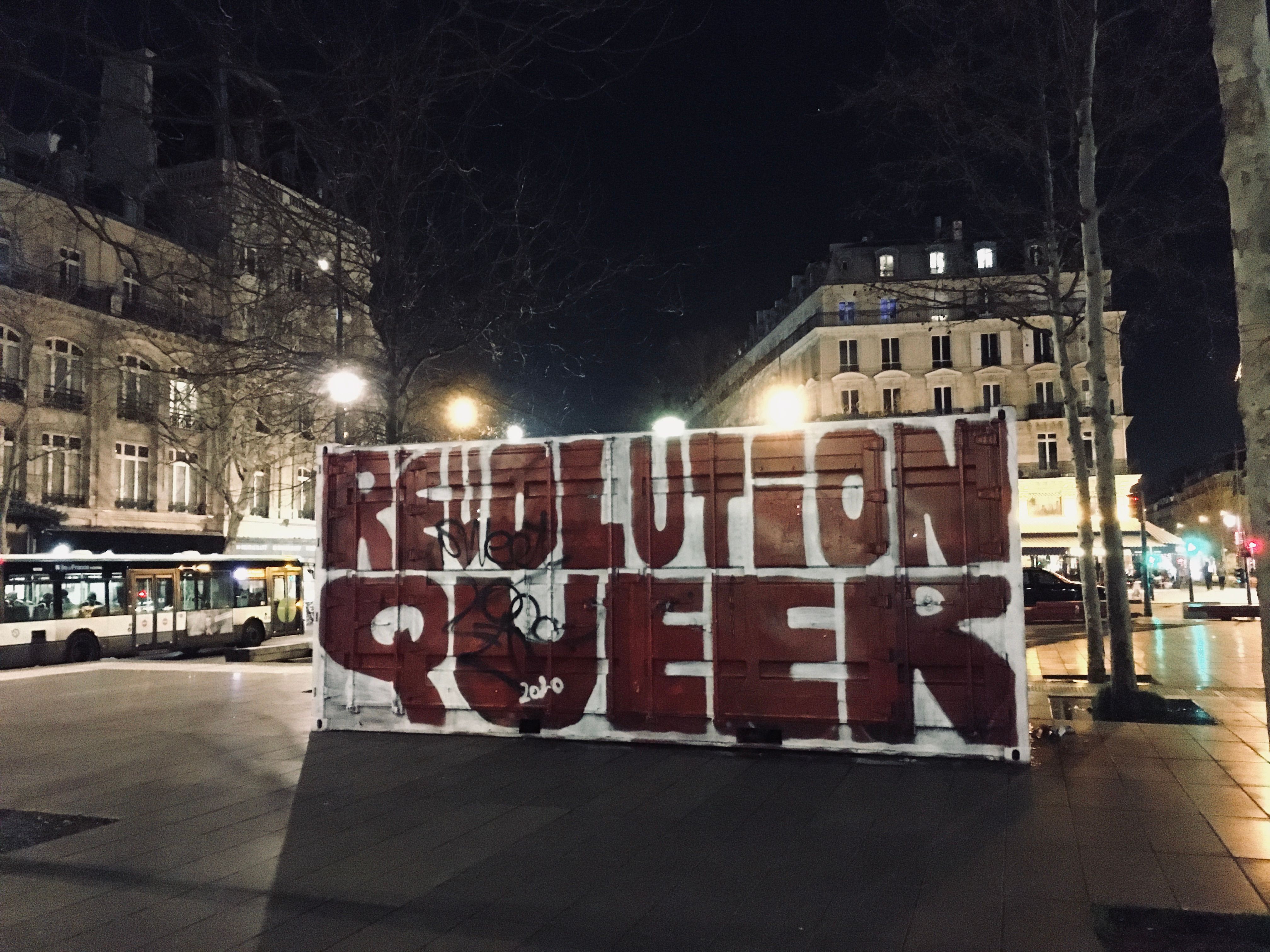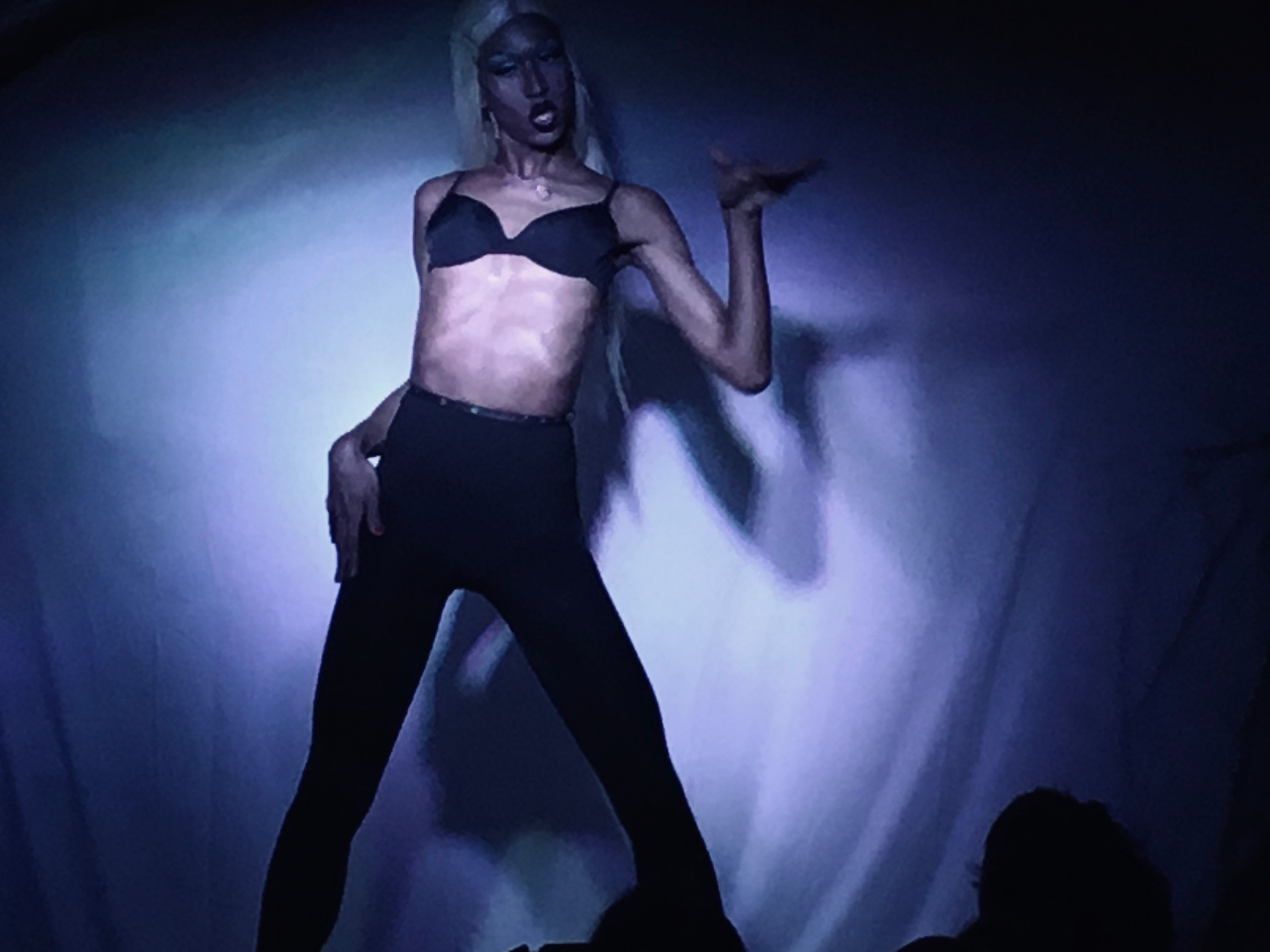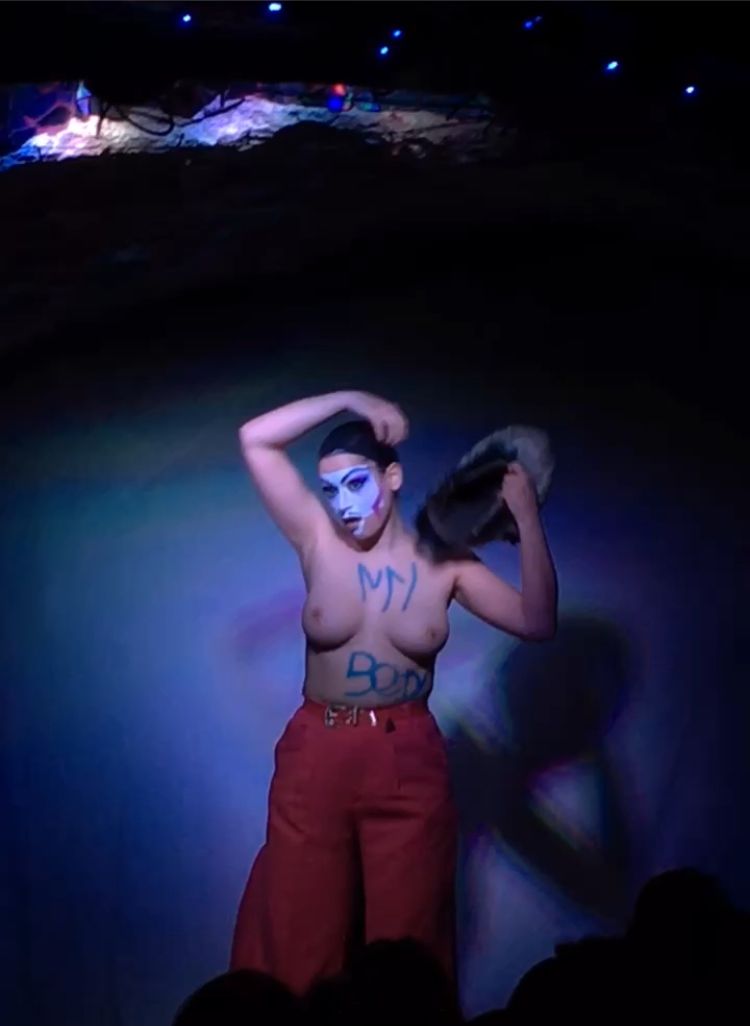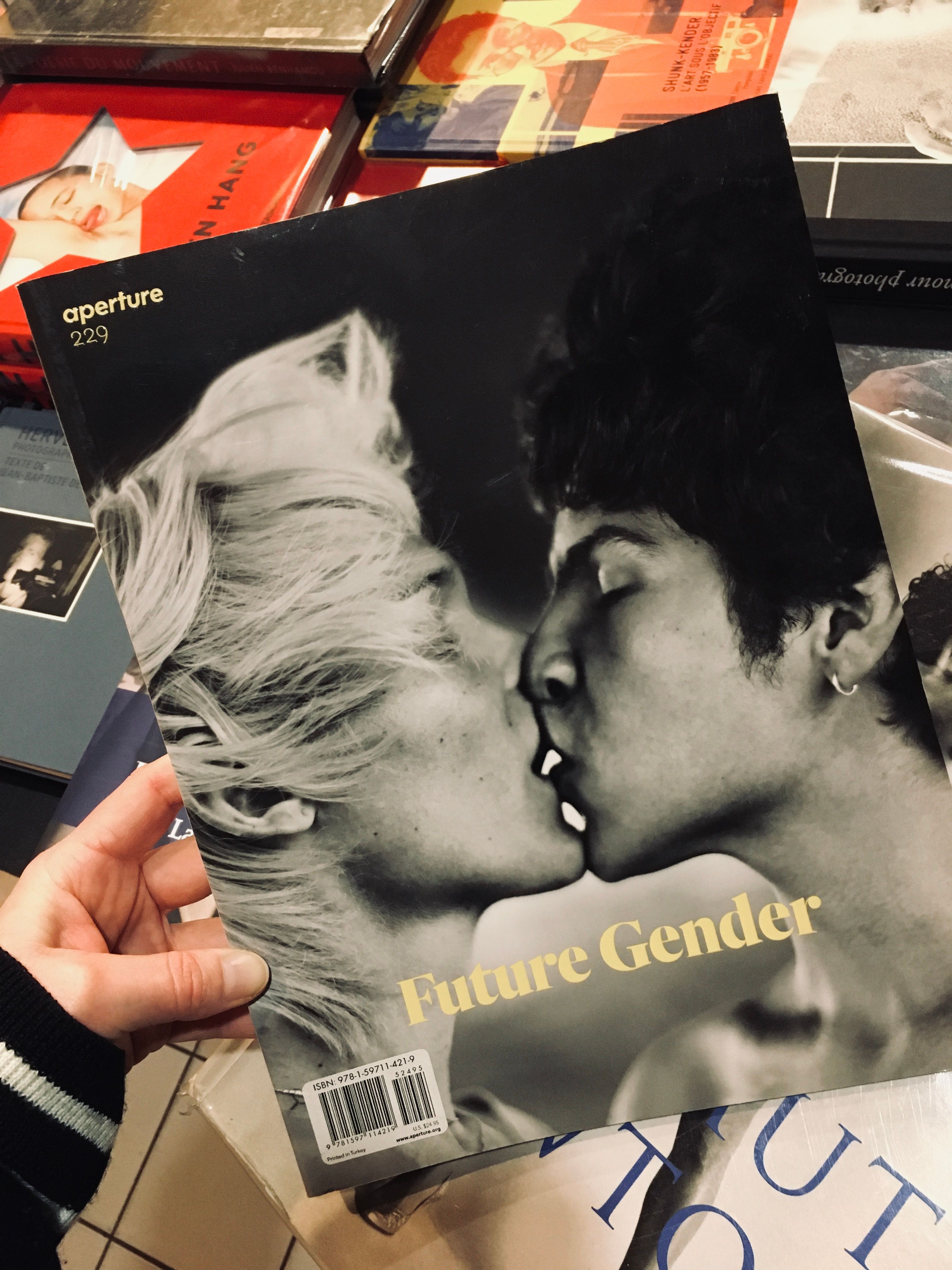Cultural Recovery: A conversation with Tine Semb

- Photo Paulina Tamara
When the pandemic hit, the nomadic queer club concept and meeting place Karmaklubb* turned their events digital almost overnight. Three of their events were presented during Oslo Internasjonale Teaterfestival 2021 as a three-part online journey named A series of bending encounters. Behind Karmaklubb*, we find Tine Semb – the founder & mastermind of it all. How has the pandemic affected Tine's work and life?
First, I must say I like that you introduce these questions by referring to Paul Preciado and his text “Learning from the virus”! There are many reasons for that, there amongst: 1) I am a fan of Preciado. 2) Another text by Preciado was one of my earliest encounters with a written emotional and intellectual fabulation on the impact of this crazy situation. However, that was the one he published in Artforum just before, on ‘on life after COVID-19’, called “The losers conspiracy”. This is a beauty of a text, more or less written as a subtle love letter. And thinking about how the people I care about quickly became more important than anything else ... This virus has put things even more into perspective. 3) In these times; the fact that we even consider referring to other pieces of art, such as Preciado’s text, illustrate exactly why we keep on trying to make art despite the situation. Art still makes an impact. Words do. So, to your questions: They are large ones, but I will trust that what first enters my mind somehow illustrates what’s precarious. But I do think it will take much longer to see the real extent and many layers of how this reality shapes and changes me, and us.
What have been the most significant changes for you over the past year since the pandemic began?
Lack of humans. Without question. And that change is not a good one. I’ve never liked masks – neither as a concept nor as something to wear. The week before Europe shut down, in March 2020, I was about to launch the Karmaklubb* programme of the year, as well as having half of 2021 roughly scheduled. Actually, I was in Paris (which is quite a coincidence as Preciado’s text mentioned above is also written from there, in almost the exact same time span), and I remember this odd moment hiding beneath a striped awning of a typical French café, sending out information all over social media about upcoming events being “postponed” ... We had stayed focused, clinging on to our plans; now the job was to try to accept that our largest projects until now — among them a queer mega ball for 1.500 people in the closest we get to a club temple in Norway, as well as a series of museum sessions — was obviously not happening in the upcoming weeks and months. I was walking around for two days in Paris, bumping into this extraordinary queer bookstore, a drag show in basements ... and I remember the urgency hitting me, thinking “what if I won’t be able to return home? What if I get infected, here in this basement? I have to get home ...” I did return to Oslo, on the day before total lockdown, where I was met by fluorescent yellow warning signs all over, armed military forces at the airport, and empty dark streets. A ghost town.

Place de la République, Paris, 11 March 2020. Photo by Tine Semb.

Last drag before lockdown, this time as a guest: NeNe Gorgeous at ‘JeudiBarré #166’, Le Yono, Paris, 12 March 2020. Photo by Tine Semb.

Last drag before lockdown, this time as a guest: Vesper Quinn / Thomas Occhio at ‘JeudiBarré #166’, Le Yono, Paris, 12 March 2020. Photo by Tine Semb.

In possibly one of the best LGBTQI+ bookstores in Europe? At least one of the oldest: Les Mots à la Bouche. Photo by Tine Semb.
To return to your question about what has changed: Enormous amounts of investments — of work, time and energy. Being put into a vacuum for who-knows-how-long, is one thing, but more important is the celebration of life through love, desire, queerness, music, art, aesthetics, bodies moving … The core of Karmaklubb* is not only about suggesting but also about creating spaces that gather people, across genders, social backgrounds, sexuality, whatever — people that would probably never meet otherwise. I usually work intensively aiming for those meetings, insisting on them being just that — as opposed to digital events and so on. The whole project is nomadic for a reason, so you can say that this nomadic aspect became slightly difficult and is to be considered a ‘significant change’. Not to mention the lack of actual clubbing and that rush of joy. At the events, I used to smile for so many hours that my face would hurt, just from watching people enjoying themselves …
This may all sound sad. But in fact, there is a beauty in it as well, throwing me back proving my point — our point — that kicked off our conversation to start with: “What can we learn from the virus?” The importance of things. I cannot promise I am able to give you the same answer in two months, six months, a year … maybe even more from now, but right now I think we are learning a lot, and that I appreciate.
Karmaklubb* has a lot of elasticity, somehow like what I believe queerness is; adaptable in the sense of interpreting the current conditions, yet always questioning and searching for new ways, alternatives; the gaps and glitches. Having a ‘queer’ view on reality is a very powerful tool! It’s a wormhole.
What has been the most challenging for you during this time of pandemic?
To draw up an image of the intensity of things: I wrote most of these notes on a plane, on a train, in-between ... that was my first time ‘off’ since you contacted me on February 8, and now three or four more weeks have just passed; it is April 14 at the time of writing. The reason we got to know each other in the first place is the Oslo Internasjonale Teaterfestival 2021, so please let me use that as a second example. To start with, we operated with a plan A, B, and C; worst conditions, expected conditions; best [but unrealistic] case scenario. We ended up with an absurd plan X as Oslo got even more restricted and we no longer had the opportunity to get the performers to the studio, not even within Norway. Also, due to 2 meters distancing we would in any case have trouble getting the two to three persons allowed on set within the same camera frame … The whole concept of our contribution to the festival was about insisting on the value of bodies being present within different architectures, spaces. So, I was thinking: “How can we practice as we preach within these frames?!”
During a couple of days, I went from my ‘quarantine’ to moving months of work and nearly the whole production to Bergen, where we at least could do the conversations sitting in the same room and also perform – which meant I rented a church (!), fixed a studio, a production assistant (PA, streaming and filming), found solutions for the technical ‘missing links’, did promotion, and did general logistics right before the festival kickoff … This is the craziness that we have to relate to as cultural producers. It was challenging, but with a lot of will, support, and of course resources (!) from Black Box teater, at least we ended up having fun and answering this situation with a safe and qualitative high result.
But, what you are asking and my answers to that might overlap with ‘significant changes’ as that is more or less synonymous with ‘challenges’. At least indisputable bound together as cause and effect. But herein also lies the potential – and again we are back, hooked on Preciado asking what we can learn, which I think is a much more constructive way of angling this ... situation. I’ve had to learn a lot. Juggle and shuffle, be able to change quickly, think differently; what can be done when all this hassle is creating bumps in the road? Adapt. I am by no means trying to praise the corona situation, knowing fully that we have a lux version of it in Norway – but speaking from this context, and the soft shittyness that is, I can still be able to appreciate aspects of it. After all, it provides me the ability to learn on so many levels, and become more aware of what’s really important. I guess you can put it like this, that the whole scenario is quite an exercise in plasticity. For me, it has resulted in the most hectic year on top of already edging ‘overwhelm’, and the situation is demanding enough in itself … I am trying to learn as I go, driven by curiosity and joy – my only compasses – yet aware of the fragility of it all. There are still things to figure out!
How do you think this pandemic will impact your work? Do you have any thoughts on how it will impact the art field? What kind of changes will it produce?
As I briefly touched upon, what is of importance — my values and purposes, what I believe is right and not — has become clearer. At the same time, I have learned to be more aware of my own limitations, such as zones. And I observe a few weird things too, like being more sensitive to people at the moment, frankly because I’m not used to being with large numbers of people anymore. It feels as if the energy balance adjusts to the situation. Luckily, the program of Karmaklubb* consists of many things in addition to events – research, ongoing conversations between people in different countries, publishing, building an archive — so even though the social part was sent into an uncertain state of some sort of ‘hibernation’, remotely taking place in virtual space, there are so much that suits these slower formats that are worth and possible to dig into.
The essence of what we are talking about here, is what this state of time provides. I assume that I personally have learnt almost as much the last year as I did through my early childhood … Children are like sponges, and that’s why the first years of life are so fundamental. As grown ups we are usually masters of getting used to stuff, which also makes the perception of time slightly different with age — at least for most people — and at worst, it causes numbness … On the other hand: Constantly climbing a steep learning curve is clearly exhausting. And it ain’t no fun anymore when all we are left with is ... imagination. We still live in a physical world full of eroticism, pleasure, joy. We cannot and shall never adapt so much that we end up losing those primary needs. And in the meantime, it's all about trying to find other ways and not slide into insanity. For sure, there are ways to establish intimacy, trust, and warmth despite this. During this time, I have also developed strong friendships that without doubt were amplified by these conditions.
What do you think the art field needs in order to be well taken care of?
An urgent question is how long this actually can last. In many ways, what we are facing and going through now has similarities to times of war; a state of emergency, including risk, where everything is unknown, uncertain, undefined; we do not know its duration or extent, and it’s all about taking one day at the time … So the art field, I believe, is indivisibly connected to ‘the bigger picture’.
A crisis can turn out in various ways, though; either cause trauma and apathy, or push forward learning, development and change. In some instances ambivalent reactions, as things are more complex than binaries. The perhaps most fundamental difference or flux we are in now, with corona, is: Although the effects of the virus to a certain extent discriminates (considering the complexities of factors as wealth, class, political climate, health and so on), this is the closest to a collective crisis humanity has ever experienced. To some extent, this situation affects everything and everyone. Having something in common could lay the grounds for maneuvering great turns together, but it could also develop in other directions. So, what really disturbs me, if I dare to take a step aside from my normal positivist view of things, is that in times of uncertainty and urgency, people tend to search for leadership. And what happens alongside solidarity, alliances, and collective movements, tends to be polarities. Just for the simple reason of things being really serious; suddenly you can feel that your values, what’s left, are threatened or at stake. And we know that democracy is based on mutual respect and agreeing on a set of ground values, and therefore fragile. So, in such pressured situations, democratic mechanisms that are taken more or less for granted are suddenly more exposed. In addition, ‘people’ are literally isolated from where the decisions are made in these ‘times of crisis’, and not allowed to gather in the streets, or anywhere. Of course, these restrictions are made to avoid contamination, nevertheless — speaking about civil rights — the consequence is that demonstrations, even speaking in public and to socialize, has become not only silenced, but banned. That is something to reflect upon.
So, what do we need? As several of our collaborators at Oslo Internasjonale Teaterfestival (e.g. Anushka Rajendran and Antonio Cataldo) and elsewhere have touched upon, whether it is on the dance floor or in other ‘architectures’: Empathy and intimacy are more important than ever. I still believe that a state of collective learning and shared processing is more powerful than anything else, particularly through experiencing on such physical and emotional levels what we care about. So, there is a lot of hope in empathy. Even possibilities to change on groundbreaking, fundamental levels in a long-term perspective.
Rather than ask what we need, perhaps we should first discuss what we care about on common ground. I don’t know; it may be utopic, but it’s all about treating others how you want to be treated yourself. In Norway, we call this ‘Kardemommeloven’. At least, let us stick to those principles as long as we can ... I don’t think challenges are the most dangerous we are facing now, rather the lack of resistance in the shape of conversational platforms. There is a fine line separating us from becoming too isolated, which makes us more rigid, less flexible, and creating echo chambers, because there is no one there to correct us or ask questions – or show us an alternative point of view. That would be an enormous step backwards.
And what comes out of that is yet unknown; it will for sure be something slightly different, as a response to everything’s happening. And I am curious to see these responses; in humanity in general, in others and in my own work. Karmaklubb* seeks to be a welcoming and extrovert being. But what I hope is that we all will be kinder, behave warmer, and be cleverer based on these experiences. And I can’t wait to join a crowded dance floor again and see smiling faces!


















